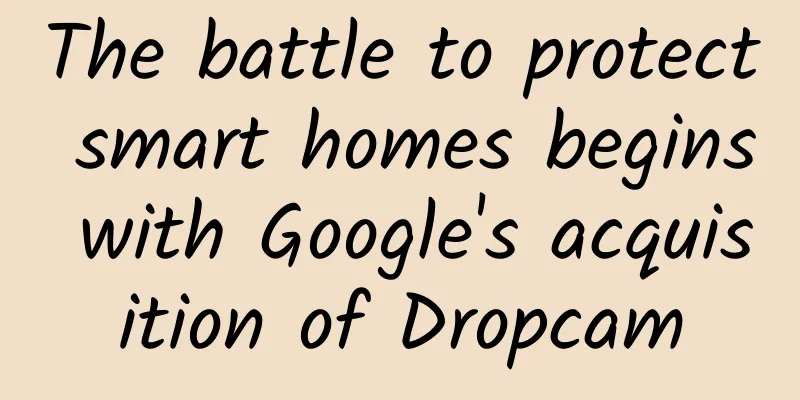The battle to protect smart homes begins with Google's acquisition of Dropcam

|
The smart home industry was a little restless in 2014. If you ask why, it is always related to the temptation of profit. Since Google acquired Dropcam, more and more companies have entered the field of smart home, and most of them are Internet companies. Looking at the international market, Apple launched the HomeKit smart home platform this year, and Samsung acquired SmartThings; looking at the domestic market, Haier joined hands with Apple, and Xiaomi tried new smart home products... Different types of companies such as home appliances, Internet, and mobile phones are optimistic about smart homes, and even traditional security companies are not to be outdone. What is certain is that home appliance manufacturers have launched smart home products one after another, but most of these products revolve around smart appliances, such as smart refrigerators and smart washing machines. The product concepts are very advanced and have received a lot of attention, but they are not popular in the market. The main reason is that the prices are too high!
Home appliance manufacturers did not stop there. For example, at Apple's new product launch in June this year, HomeKit was Apple's entry point. Apple was not fighting alone. Honeywell, Philips, and Haier became Apple's partners. As a first-tier domestic home appliance brand, Haier's influence in China has been greatly enhanced by its cooperation with Apple. The defense of home appliance brands in the field of smart home seems conservative but bold. In addition to Haier, brands such as LG and Samsung have also become the focus of attention. For example, Samsung acquired SmartThings. It has to be said that from products to platforms, home appliance manufacturers have made full preparations. The traditional security companies are the ones who benefit the most from the development of smart homes. Serving end consumers is not their strong point, but they have unsurpassed technology, especially home smart cameras. Relying on professional monitoring technology, they develop home monitoring products and can better control costs. Then contact third-party software developers to combine hardware with APP to achieve the purpose of remote monitoring. In addition, another advantage of traditional monitoring manufacturers is that they can use cooperation with operators to realize home cloud storage services, reduce terminal storage pressure, and charge service fees more reasonably. The advantage of security companies lies in technology, while their disadvantage lies in their ability to be close to consumers. Take Hikvision, a leading domestic security company, for example. In 2014, it focused on the "Ezviz" brand, launched smart cameras, boxes and other products, and vigorously promoted smart home products. Perhaps this is the style of traditional security companies. When most smart home cameras were still priced at 500 to 1,000 yuan, they had enough strength to launch low-priced, high-quality products. The defense war is so domineering. Of course, in the past two years, we have seen that more and more Internet companies are also moving towards the fields of smart home and smart video. The largest single transaction was Google's acquisition of Nest for $3.2 billion. Nest has smart home products such as smart thermostats and smoke sensors. After Nest was acquired by Google, it also acquired an innovative company called Dropcam. Dropcam is a smart camera that is mainly aimed at home users. It supports cloud storage services and mobile client viewing, allowing users to monitor their home anytime and anywhere. From Nest to Dropcam, Google has extended its reach from smart homes to home security, completing another battle to defend the home market. Since Google acquired Dropcam, major Internet companies have all entered the field of intelligent video. Hikvision and Alibaba Cloud Computing have reached a strategic cooperation. The two sides have carried out in-depth integration in cloud computing, IoT cloud intelligence and other aspects, and will jointly promote the application of cloud computing and big data technology in home monitoring, personal safety life and safe city construction. EZVIZ and Baidu jointly developed video content services, intelligent analysis and search services, providing users with richer video content based on the Internet search portal dominated by static pictures and text. Whether it is Alibaba or Baidu, the cooperation between traditional security companies and e-commerce and Internet companies has formed a new form. The battle to protect smart homes is also developing in a diversified way. Let us wait and see who will have the last laugh! |
<<: Apple's chief designer: All large-screen phones other than iPhone 6 are "dumb and big"
>>: How much has the visual system of Apple's OS X changed after 13 years?
Recommend
Real case | Using this method, the conversion rate of user orders increased by 5 times!
Have you ever encountered such a situation? ——Aft...
How to solve the problem of fast battery consumption in iOS
To be honest, although Apple's iOS tuning for...
Product analysis of Zuoyebang APP!
Currently, the entire Internet education market i...
Agan talks about cross-border Amazon operations
Cross-border learning is not just a PPT with audi...
Millions of IPs Create Science and Technology Talents to Strengthen the Country丨Marine Science: How the Western Pacific Warm Pool Regulates Global Climate
As the largest heat reservoir in the Earth's ...
Macworld/iWorld exhibition will be cancelled this year
[[121192]] Steve Jobs unveils the first iPhone at...
An article to understand the product logic and strategic layout behind the Alipay 9.0 revision
[[140494]] About the Alipay 9.0 revision: If you ...
Ten pictures tell you how traditional enterprises integrate with the Internet
Internet boy: soaring up to 90,000 miles, instant...
Cook talks about car project for the first time: Apple is developing autonomous driving system
Recently, Apple CEO Tim Cook explained the company...
The darker the soy sauce, the better? Three types of people should pay attention when eating soy sauce!
Rumors 1. Eating soy sauce will make your skin da...
Case analysis: Is it difficult for paid course mini-programs to grow? Achieve 30% growth using this method
In this case, the fission mechanism of inviting f...
Basic data that operators must know: Data analysis on "new users"
As an operator , it is essential to deal with dat...
The probability of an asteroid hitting the Earth is 3.1%? Don't panic, it's just an estimate! The defense system is already being deployed
Recently, the topic that an asteroid numbered &qu...
Google will shut down account login for Android 2.3.7 and earlier versions
[[414551]] According to foreign media 9to5Google,...









